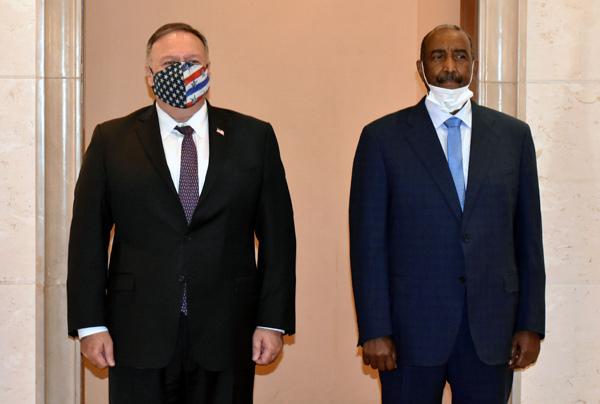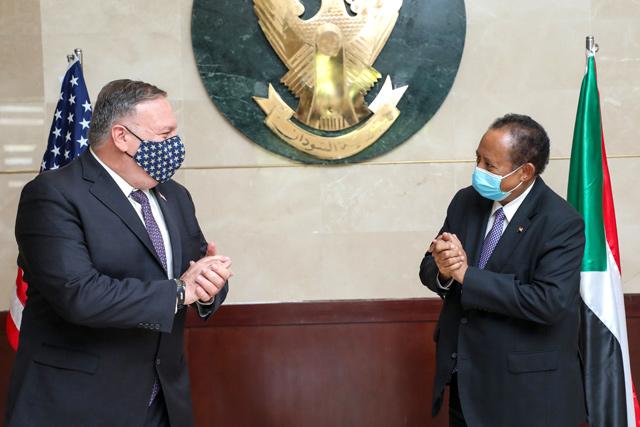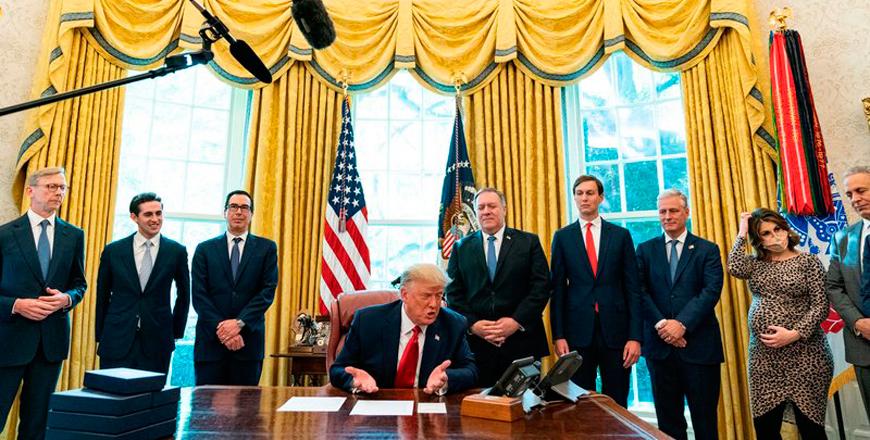You are here
US takes Sudan off sponsors of terror blacklist
By AFP - Dec 14,2020 - Last updated at Dec 16,2020

In this file photo taken on August 25, US Secretary of State Mike Pompeo (left) poses for a photo with Sudan's Sovereign Council chief General Abdel Fattah Al Burhan in Khartoum (AFP photo)
KHARTOUM — The United States on Monday removed Sudan from its state sponsors of terrorism blacklist and declared a "fundamental change" in relations, less than two months after the Arab nation pledged to normalise ties with Israel.
The move opens the way for aid, debt relief and investment to a country going though a rocky political transition and struggling under a severe economic crisis exacerbated by the COVID-19 pandemic.
US President Donald Trump had announced in October that he was delisting Sudan, 27 years after Washington first put the country on its blacklist for harbouring Islamists.
The US embassy in Khartoum Monday said the step had been formalised, and Secretary of State Mike Pompeo later confirmed that "Sudan's designation as a state sponsor of terrorism is officially rescinded".
"This represents a fundamental change in our bilateral relationship toward greater collaboration and support for Sudan's historic democratic transition," Pompeo said in a statement.
Sudan's army chief General Abdel Fattah Al Burhan — who doubles as the head of the Sovereign Council, the country's highest executive authority — offered his "congratulations to the Sudanese people".
“It was a task accomplished... in the spirit of the December revolution”, he said on Twitter, referring to a landmark month in 2018 when protests erupted against Omar Al Bashir.
Bashir was deposed by the military in April 2019, four months into the demonstrations against his iron-fisted rule and 30 years after an Islamist backed coup had brought him to power.
Pompeo said that “we commend the calls of the Sudanese people for freedom, peace and justice, and we congratulate the members of the civilian-led transitional government for their courage in advancing the aspirations of the citizens they serve”.
The US Treasury said it planned to work with Sudan “to help clear its arrears at the international financial institutions and to advance Sudan’s efforts to secure debt relief in 2021”.
The European Union also hailed the “significant milestone”, saying it would provide “positive momentum for the country’s economic recovery and move it closer to an eventual debt relief”, a goal it said the EU supports.
‘Global siege’ lifted
Sudan’s Prime Minister Abdalla Hamdok also welcomed Washington’s move in a post on Facebook, noting that it means “our beloved country... [is] relieved from the international and global siege” provoked by Bashir’s behaviour.
The removal of the designation “contributes to reforming the economy, attracting investments and remittances of our citizens abroad through official channels” and creates new job opportunities for youth, the premier said.
As part of a deal, Sudan agreed to pay $335 million to compensate survivors and victims’ families from the twin 1998 Al Qaeda attacks on US embassies in Kenya and Tanzania, and a 2000 attack by the jihadist group on the USS Cole off Yemen’s coast.
Those attacks were carried out after Bashir had allowed then Al Qaeda leader Osama Bin Laden sanctuary in Sudan.
Sudan in October became the third Arab country in as many months to pledge that it would normalise relations with Israel, after the United Arab Emirates and Bahrain.
The transitional government’s pledge came amid a concerted campaign by the Trump administration to persuade Arab nations to recognise Israel, and it has been widely perceived as a quid pro quo for Washington removing Sudan from its terror blacklist.
But unlike the UAE and Bahrain, Sudan has yet to agree a formal deal with Israel, amid wrangling within the fractious transitional power structure over the move.
Cracks in transition
The first major evidence of engagement between Sudan’s interim authorities and Israel came in February, when Burhan met Israeli Prime Minister Benjamin Netanyahu in Uganda.
In late November, a spokesman for the Sovereign Council, comprised of military and civilian figures, confirmed that an Israeli delegation had visited Khartoum earlier in the month.
Sudan’s transition has lately displayed signs of internal strain. Burhan last week blasted the transitional institutions, formed in August 2019 after months of further street protests demanding the post-Bashir military share power with civilians.
“The transitional council has failed to respond to the aspirations of the people and of the revolution,” Burhan charged while also lauding the integrity of the military.
Trump sent his notice to remove Sudan from the terror blacklist to Congress on October 26. Under US law, a country exits the list after 45 days unless Congress objects, which it has not.
Families of victims of the September 11, 2001 attacks had called on lawmakers to reject the State Department’s proposal, saying they want to pursue legal action against Sudan.
Related Articles
KHARTOUM — The first US ambassador to Sudan in 25 years took up his post on Wednesday in the latest easing of ties since Washington removed
KHARTOUM — Washington once labelled Khartoum a hub of the “axis of evil”, but relations between the US and Sudan have warmed since hardline
KHARTOUM — Sudan signed on Wednesday the “Abraham Accords” ties with Israel, alongside an aid agreement promising $1 billion annual World Ba













